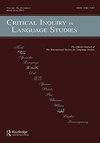Heritage-language education policies, anti-racist activism, and discontinuity in 1970s and 1980s Toronto
引用次数: 3
Abstract
ABSTRACT This paper examines the intersection of heritage-language education advocacy with anti-racist activism in the 1970s and 1980s in Toronto. The province of Ontario initiated the Heritage Languages Program in 1977. By focusing on discontinuities in the policy’s implementation, the paper identifies multiple strategies that Black anti-racist activists used to expand the understanding of heritage language to be more inclusive of all forms of racial and linguistic difference. Although anti-racist activists may not have succeeded, we argue here, recovering their arguments can – and should – inform current efforts to deepen linguistically- and culturally-sustaining programs in Ontario schools. The first part of the paper describes the historical context in which heritage language became a social problem recognizable to Canadian society. It is in this context that the Heritage Languages Program emerged as a policy solution to the perceived problem of racial and linguistic difference in Ontario. The second part reports our analysis of the intersection between public deliberation over the HLP and advocacy against anti-Black racism in the 1970s and early 1980s.多伦多的传统语言教育政策、反种族主义激进主义和不连续性
摘要本文考察了20世纪70年代和80年代多伦多传统语言教育倡导与反种族主义活动的交叉。安大略省于1977年启动了遗产语言计划。通过关注政策实施中的不连续性,本文确定了黑人反种族主义活动家用来扩大对传统语言的理解的多种策略,以更包容所有形式的种族和语言差异。尽管反种族主义活动家可能没有成功,但我们在这里认为,恢复他们的论点可以——也应该——为目前深化安大略省学校语言和文化支持项目的努力提供信息。本文的第一部分描述了遗产语言成为加拿大社会公认的社会问题的历史背景。正是在这种背景下,遗产语言计划成为安大略省种族和语言差异问题的政策解决方案。第二部分报告了我们对20世纪70年代和80年代初公众对HLP的审议与反对反黑人种族主义的宣传之间的交叉点的分析。
本文章由计算机程序翻译,如有差异,请以英文原文为准。
求助全文
约1分钟内获得全文
求助全文
来源期刊

Critical Inquiry in Language Studies
Arts and Humanities-Language and Linguistics
CiteScore
5.30
自引率
0.00%
发文量
23
 求助内容:
求助内容: 应助结果提醒方式:
应助结果提醒方式:


